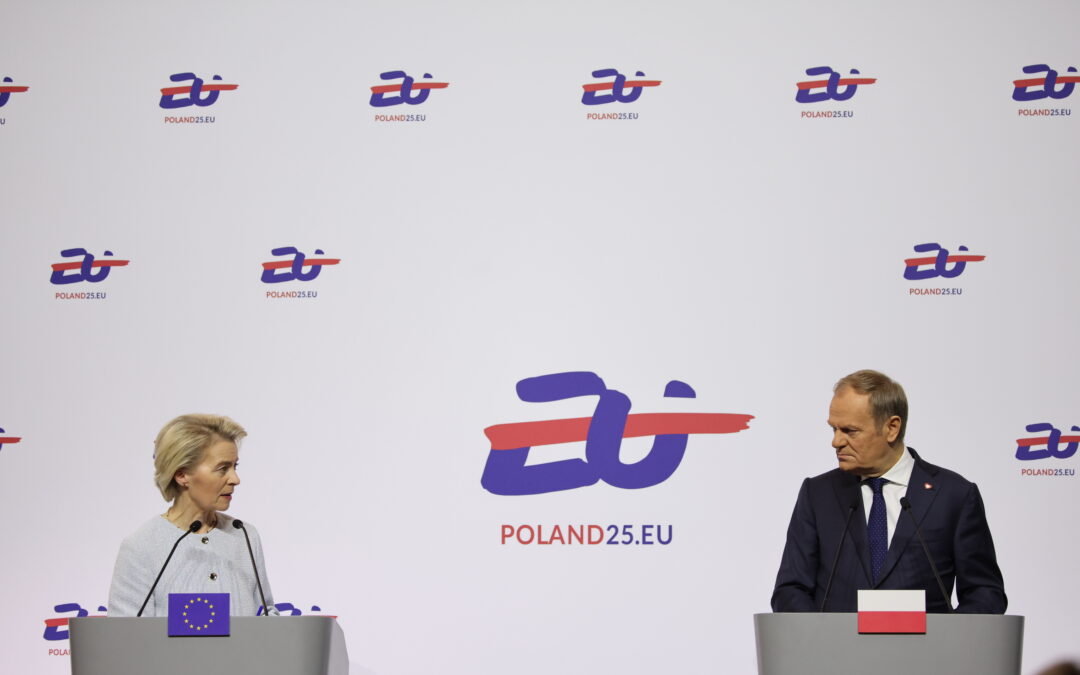Keep our news free from ads and paywalls by making a donation to support our work!

Notes from Poland is run by a small editorial team and is published by an independent, non-profit foundation that is funded through donations from our readers. We cannot do what we do without your support.
The European Union will “take into account” the “extraordinary solidarity” Poland has shown to Ukrainian refugees when it implements the new migration pact, European Commission President Ursula von der Leyen has announced following meetings with the Polish government.
She also acknowledged the “hybrid threat” Poland has been facing on its eastern border with Belarus, where she notes that the Belarusian authorities have been “weaponising migrants” to create a crisis.
Like security, preparedness must lie at the heart of everything we do.
We are facing growing hybrid threats.
From sabotage in the Baltic Sea to migrants pushed over the Polish borders by the Lukashenko regime.
We stand in solidarity with Poland ↓ https://t.co/mjOmxoHiRS
— Ursula von der Leyen (@vonderleyen) February 7, 2025
Poland has expressed strong opposition to the “solidarity” mechanism in the EU’s new migration pact, whereby member states would be required to help those facing higher migration pressures by either receiving relocated asylum seekers or providing financial support.
Last week, Prime Minister Donald Tusk said that his government “will not implement” the pact if it involves the “forced acceptance of migrants”.
However, the pact includes measures intended to reduce the “solidarity” contributions of countries that have themselves faced migratory pressures.
During a visit to Gdańsk today for meetings with the Polish government, von der Leyen said that Poland’s support for Ukrainian refugees would be acknowledged.
“Poland has shown, and is showing, an extraordinary solidarity with Ukraine,” she said, speaking alongside Tusk. “Hosting the largest number of Ukrainian refugees for almost three years now.”
“This is something which has to be taken absolutely into account,” she continued, “something the European Union will not only take into account but will also respect – this extraordinary solidarity – but also, of course, the work that Poland is doing.”
Poland "will not implement" the EU migration pact if it involves the "forced acceptance of migrants", says @donaldtusk.
That would "waste the efforts of our border officers who are risking their lives" to make “Poland one of the safest places in Europe" https://t.co/ZUTLcmRkHA
— Notes from Poland 🇵🇱 (@notesfrompoland) February 4, 2025
The European Commission president also pointed out that, in addition to taking in Ukrainian refugees, Poland is facing an ongoing migration and security crisis on its – and the EU’s – eastern border with Belarus, where tens of thousands of migrants and asylum seekers have tried to cross.
“This is not a classical irregular migration, this is weaponising migrants,” said von der Leyen, referring to the fact that Belarus and Russia have encouraged and assisted crossings. “This is not a question of migration but a question of national security. Therefore, we see it as a hybrid threat.”
“This is a security challenge not only for Poland but for the whole of Europe, and this is why we stand in full solidarity with Poland, Finland, Lithuania and Latvia,” she added, referring to other eastern EU member states that have faced migratory pressure from Belarus and Russia.
The EU is allocating funds to countries neighbouring Russia and Belarus to strengthen borders against the "weaponisation of migrants".
It also says states can introduce measures that “may entail serious interference with fundamental rights such as asylum” https://t.co/mqho2vBZeb
— Notes from Poland 🇵🇱 (@notesfrompoland) December 12, 2024
Tusk himself said that he was “glad that my arguments have found a hearing and an understanding that Poland will not implement the migration pact in a way that would result in additional migrant quotas in Poland”.
“Poland has opened its borders and its heart to two million refugees from Ukraine,” he said. “If it occurs to anyone in Europe to consider that Poland is yet to take on other burdens, then no matter who says it, I will say that Poland will not implement it, end of story, period.”
According to EU data, Poland currently hosts just under one million Ukrainian refugees, the second-highest figure in the EU after Germany. In the aftermath of Russia’s full-scale invasion of Ukraine in 2022, Poland was the primary destination for the millions who fled westwards.
💬 PM @DonaldTusk in #Gdańsk:
I once again confirmed that Poland will not implement the Migration Pact in a way that would result in any additional quotas of migrants in Poland.
— Polish presidency of the Council of the EU (@POLAND25EU) February 7, 2025
Tusk also said he was “thankful that today we have received confirmation that the obligations arising from the protection of the [eastern] border will be treated as common – not Polish, but European”.
“Thank you for this assurance that the European Commission and you, Madame President, will personally bear in mind that Europe needs to invest much more and more boldly when it comes to securing the eastern border,” he told von der Leyen.
A European Commission delegation, led by von der Leyen, has been visiting Gdańsk – Tusk’s home city – to mark Poland’s six-month presidency of the Council of the European Union. Today, Polish government ministers attended thematic meetings with their European Commission counterparts.
The EU Commissioners, together with Polish ministers, participated in thematic clusters.#Poland25eu pic.twitter.com/FbWljqY5Rv
— Polish presidency of the Council of the EU (@POLAND25EU) February 7, 2025

Notes from Poland is run by a small editorial team and published by an independent, non-profit foundation that is funded through donations from our readers. We cannot do what we do without your support.
Main image credit: EC – Audiovisual Service

Alicja Ptak is deputy editor-in-chief of Notes from Poland and a multimedia journalist. She has written for Clean Energy Wire and The Times, and she hosts her own podcast, The Warsaw Wire, on Poland’s economy and energy sector. She previously worked for Reuters.



















